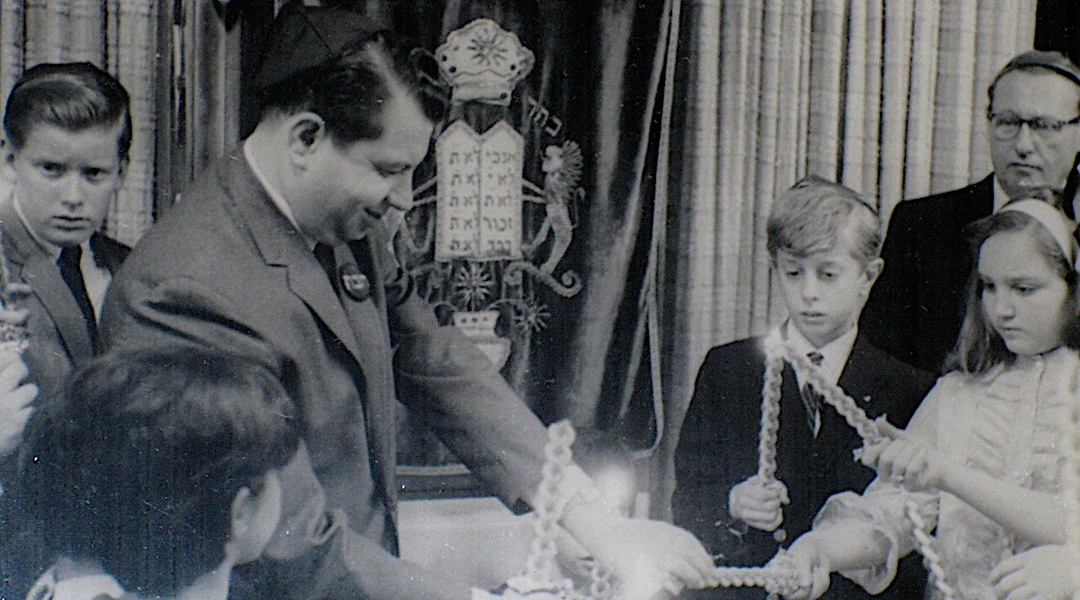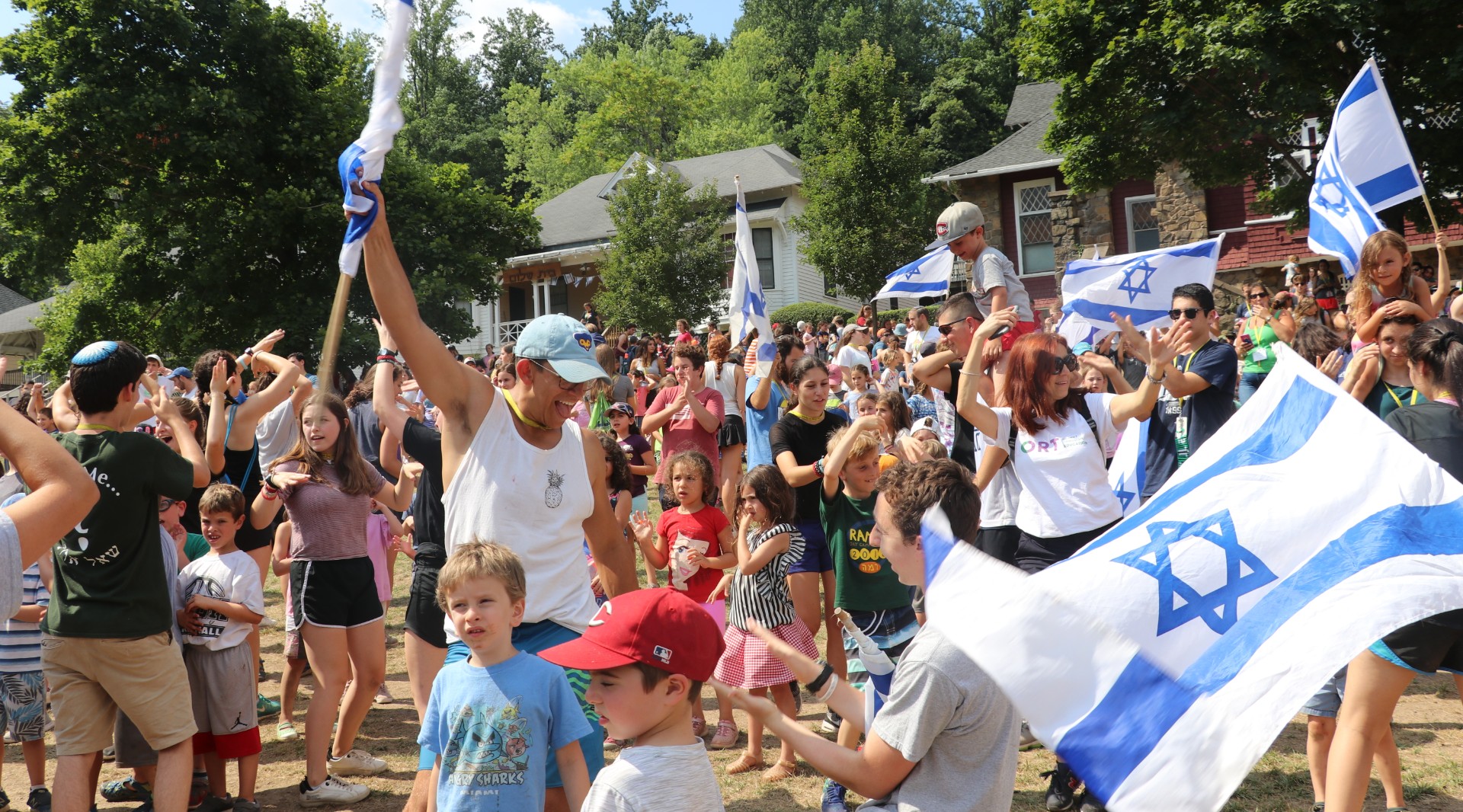Rabbi Albert Thaler, founding director of Ramah Nyack day camp, dies at 91
Staff at the day camp in New York’s Rockland County went on to prominent roles in synagogues and Jewish education

Rabbi Albert Thaler leads a havdalah service at the Queensboro Hill Jewish Center, the synagogue where he worked for 25 years until, in 1980, becoming rabbi of Temple Gates of Prayer, also in Queens, New York. (Courtesy Steve North)
(New York Jewish Week) — When Rabbi Albert Thaler was invited to run Ramah Day Camp in Nyack in 1970 it had neither staff nor campers. It did have a site — a campus in New York’s Rockland County that had hosted American Seminar, a program for youngsters who were unable to attend one of the Conservative movement’s signature programs in Israel.
Over the next few years, Thaler would build “Ramah Nyack” into one of the most successful camps in the Ramah network, drawing devoted campers from New Jersey, Queens, Manhattan and New York’s Westchester County.
Perhaps as importantly, it developed an elite staff of counselors and educators, offering budding rabbis and future lay and professional leaders a chance to work with children during the day and, unusual among day camps, to live and learn at the camp overnight — what Thaler called “the best of both worlds.”
“During my twenty-seven years as director I felt that our work with the staff was as important, if not more important than our work with the children, for they too were ‘our children,’” he recalled in a 2007 essay celebrating the Ramah movement’s 60th anniversary.
The result was one of the most successful camps in the Ramah network, seeding synagogues and other Jewish institutions with alumni who brought a high level of literacy and ruach — a Hebrew word meaning “spirit” — to suburban congregations. Former staff include a number of prominent educators and rabbis, including Rabbi Menachem Creditor, scholar in residence of UJA-Federation of New York; Rabbi Irwin Kula, the president of CLAL: The National Jewish Center for Learning and Leadership; Rabbi Shai Held, the president of the Hadar Institute; Rabbi Paul Mack Drill of the Orangetown (New York) Jewish Center and Valerie Weisler, the founder and chief executive officer of The Validation Project, a youth mentoring program.
Thaler also estimated that 40 married couples met during summers at Ramah Nyack.
Thaler, who ran the camp until 1997 and also served for 37 years as rabbi of Temple Gates of Prayer in the Flushing neighborhood of Queens, died April 18. He was 91.
“He was a visionary leader and educator who inspired generations of children and young adults, and served as a mentor and role model for many Ramah directors,” Ramah administrators wrote in a notice announcing his death.
For Judaism’s Conservative denomination, a centrist movement that has seen declining membership since its peak in the 1950s and ’60s, the Ramah camps have been seen as an enduring success story. Arnold Eisen, a former chancellor of the movement’s Jewish Theological Seminary and a historian of American Judaism, once described the camps not only as “one of the finest accomplishments” of the movement but “one of the finest accomplishments of American Judaism as a whole.”
Thaler wrote that part of the camp’s effectiveness lay in offering intense Jewish experiences that many of the campers and counselors weren’t getting at home. “Every summer we were creating an active Jewish community whose participants worked, played, studied, taught, inspired, and in turn were themselves inspired,” he wrote in 2007.
Shuly Rubin Schwartz, a professor of American Jewish history who succeeded Eisen as JTS chancellor in 2020, credited Ramah camps with “rigorous requirements” that “demanded a great deal from everyone in terms of study, observance, Hebrew speaking, and community building.”
But in a number of tributes that followed news of Thaler’s death, former staff and campers spoke less about the rigor than the humane example set by Thaler.

At Camp Ramah Nyack, in New York’s Rockland County, staffers stay overnight when the campers go home for the day. (Courtesy of Ramah Nyack)
Creditor shared one of those examples. “Every day he would walk the grounds and pick up trash, because this was holy ground where boys and girls learned and played,” Creditor recalled. “Thank you, Rabbi Thaler, for teaching me how to love holy ground.”
Steve North, a writer and radio journalist who grew up attending Sunday School at the Queensboro Hill Jewish Center, where Thaler was rabbi for 25 years, called Thaler “one of the most respected and beloved people I’ve ever known.” After North’s father died in 1986, the Thalers invited his family to the Passover seder at their home every year for decades.
Albert Thaler was born July 5, 1932, the second of three brothers, and grew up on Manhattan’s Lower East Side in a Yiddish-speaking home. He attended Rabbeinu Yaakov Yosef yeshiva starting in the sixth grade. He was ordained at the Jewish Theological Seminary where he received a master’s degree in Hebrew Literature and was awarded the degree of doctor of divinity, honoris causa.
He served as rabbi at the Queensboro Hill Jewish Center in Queens until 1980, and then as senior rabbi from 1980 to 2017 at Temple Gates of Prayer in Flushing.
His survivors include his daughters Dena Thaler and Judy Kane and eight grandchildren. His wife, Shirley Thaler, died in 2018. His son, Rabbi Richard Thaler, died in 1997.
Thaler retired from Ramah Nyack in 1997 and was succeeded by Amy Skopp Cooper, its current director. “His visionary leadership, charismatic personality, and creative brilliance have left an enduring mark on Ramah,” she wrote in a Facebook post.
This article originally appeared on JTA.org.















